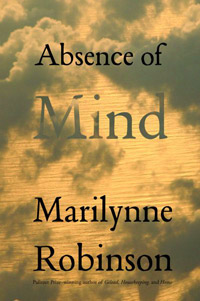
Buy it from Amazon
FYI, these are sometimes referral links!
| Subtitle | The Dispelling of Inwardness from the Modern Myth of the Self |
| First Written | 2010 |
| Genre | Non-fiction |
| Origin | US |
| Publisher | Yale University Press |
| ISBN-10 | 0300145187 |
| ISBN-13 | 978-0300145182 |
| My Copy | library copy |
| First Read | April 28, 2012 |
Absence of Mind
The discussion of Phineas Gage really surprised me with its obviousness. I learned about Gage in high school, and never thought about him like a real person.
Phineas Gage was a railroad worker who suffered some fairly grotesque brain damage in an accident, but suffered no apparent loss of brain function. But as his wounds healed (with no pain, they say), his colleagues and community noted that he became rude, mean, and blasphemous; character traits he had heretofore never exhibited. In school this was used as evidence to prove that the flying railroad spike damaged or removed the part of this brain that inhibited these behaviors. But Robinson thinks of Gage as a human being, and asks: wouldn't someone who suffered a 18th-century brain injury be in a lot of pain? And haven't we all experienced how intense pain can make us mean, rude, and cranky? If Gage's livelihood was taken away, wouldn't that be a likely cause for depression, social withdrawal, and even blasphemy?
Noted on May 16, 2012
In general, I note how screedy these essays can get, how suprisingly graceless toward the ideas and authors Robinson is debating - or outright dismissing.
Noted on May 16, 2012
The characterization of religion by those who dismiss it tends to reduce it to a matter of bones and feathers and wishful thinking, a matter of rituals and social bonding and false etiologies and the fear of death, and this makes its persistence very annoying to them.
Quoted on May 16, 2012
These questions are not meant to invoke any sort of populist standard, as if I were to say, “The man on the street may be wholly unaware that metaphysics has been deconstructed, and might not approve the project if he were aware of it.” No, quite the opposite. They are meant to call to mind the voice of the Psalmist, the voice of any ancient poet, saint, or visionary on the far side of the threshold who has attested to his or her own sense of the holy, and all those who are moved by these voices and attest to the truth of them.
Quoted on May 16, 2012